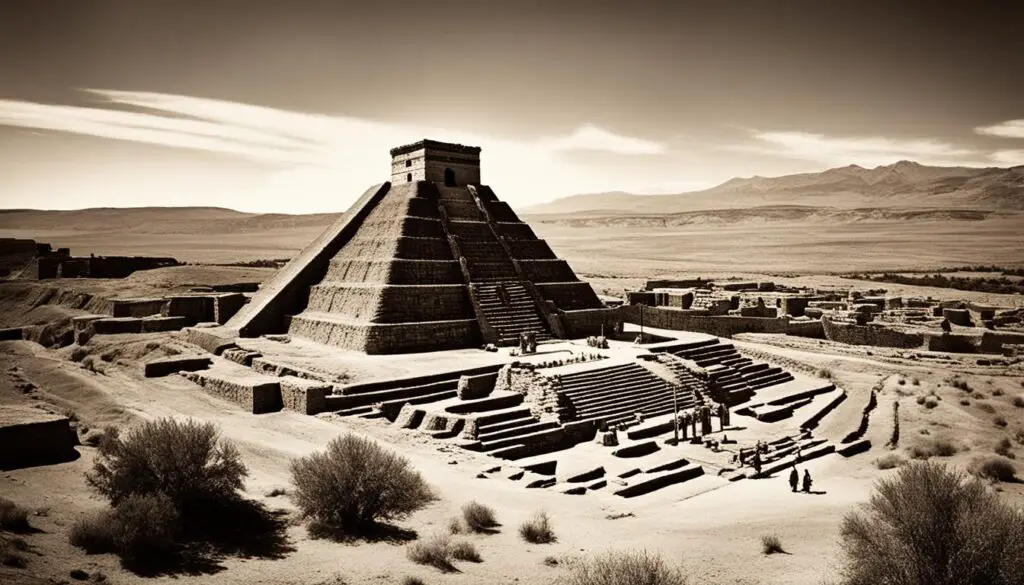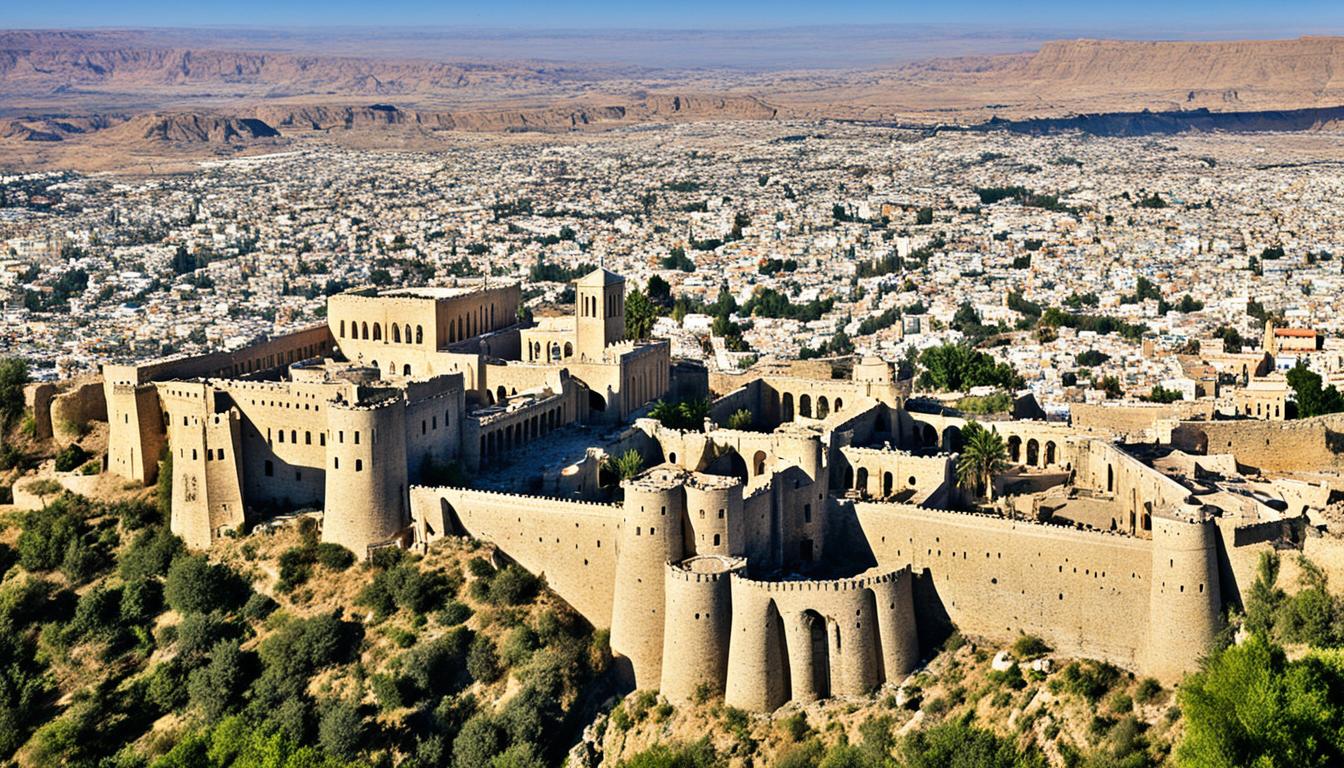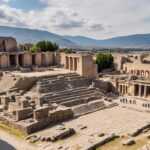Gibeon, a city with a fascinating biblical history, holds a significant place in Scripture. It is mentioned in various biblical accounts, underscoring its relevance and importance. The Gibeonites, the inhabitants of Gibeon, play a prominent role in the Old Testament, shaping the narrative of the Israelites’ journey and God’s faithfulness to His people.
The story of Gibeon offers a rich tapestry of theological and historical significance, shedding light on the interactions, conflicts, and cultural practices during biblical times. Through its mention in the Bible, Gibeon provides valuable insights into the faithfulness and sovereignty of God, offering timeless lessons and teachings.
Key Takeaways:
- Gibeon is mentioned in various biblical accounts, highlighting its significance in Scripture.
- The Gibeonites, the inhabitants of Gibeon, play a prominent role in the Old Testament.
- Gibeon’s story offers valuable insights into the interactions, conflicts, and cultural practices of biblical times.
- The theological themes in Gibeon emphasize the importance of seeking God’s guidance and making wise decisions.
- Gibeon’s legacy extends beyond its physical boundaries, leaving a lasting impact on Scripture and believers throughout generations.
Historical Significance of Gibeon
Gibeon, a city located in the Promised Land, holds immense historical significance, especially in biblical history. The city played a pivotal role during the time of Joshua and the Israelites, with its mention in the Bible shedding light on the interactions and conflicts between different nations. Gibeon’s strategic location and cultural prominence contributed to its status as a prominent city in biblical times.
During the conquest of the Promised Land, Gibeon became a key player in the unfolding events. The Gibeonites, a Canaanite people, sought to make a treaty with the Israelites by deceiving Joshua and the elders into believing they were from a distant land. Despite the deception, Joshua honored the treaty, and Gibeon was spared from destruction by the Israelites. This event showcases the historical significance of Gibeon in shaping the relationships between neighboring nations and the Israelites.
The Gibeonites deceived Joshua and the Israelites, but their cunning plan revealed the complexities of the political landscape in biblical times. It also highlighted the importance of diplomacy and strategic alliances in the ancient world.
Gibeon’s role in the Bible further highlights its historical significance. The city is mentioned in various biblical accounts, showcasing its influence and relevance in the biblical narrative. The Gibeonites’ interaction with the Israelites and their inclusion in the Old Testament narrative provide a window into the cultural and social dynamics of the region during that time period.
Strategic Location and Cultural Significance
Gibeon’s strategic location contributed to its historical significance. Situated around six miles northwest of Jerusalem, Gibeon acted as a hub connecting different regions and trade routes. Its prominence as a city of cultural and religious importance further added to its legacy.
The city of Gibeon was home to a renowned sanctuary, making it a significant religious center during biblical times. The Gibeonites were known for their unique religious practices and customs, which had a considerable influence on the surrounding region.
Gibeon’s cultural and religious significance can be seen through its renowned sanctuary, which attracted pilgrims from various regions. The city became a center of worship, playing a crucial role in the spiritual life of the Canaanites and the Israelites.
Archaeological excavations in Gibeon have uncovered artifacts that provide further evidence of its historical importance. Pottery, structures, and other findings have offered valuable insights into the city’s past and its interactions with neighboring civilizations. These archaeological discoveries continue to shape our understanding of Gibeon’s role in biblical history.
Gibeon’s historical significance lies not only in its biblical mentions but also in its cultural, political, and geographical contributions to the ancient world. The city’s legacy serves as a testament to the interconnectedness of civilizations and the dynamic nature of biblical history.
Geographical Location of Gibeon
Gibeon, a city of great historical and biblical significance, is situated in the central part of ancient Canaan, which corresponds to modern-day Israel. This strategic location placed Gibeon approximately six miles northwest of Jerusalem, making it a notable city during biblical times.
The exact coordinates of Gibeon are 31° 47′ 56″ N, 35° 8′ 45″ E, pinpointing its position on the map with precision. These coordinates not only mark the physical location of Gibeon but also serve as a reminder of its historical and cultural importance.

The geographical setting of Gibeon played a vital role in shaping the events that unfolded in the biblical accounts associated with this city. From its position in relation to neighboring cities to its proximity to significant trade routes, Gibeon’s location influenced its status and interactions within the region.
Archaeological Discoveries in Gibeon
Excavations in Gibeon have uncovered a wealth of archaeological findings that offer fascinating insights into the history and culture of this ancient city. These discoveries provide a tangible connection to the biblical accounts and historical records surrounding Gibeon.
Among the artifacts unearthed at the Gibeon archaeological site are exquisite pottery pieces, offering a glimpse into the craftsmanship and artistic expression of the ancient inhabitants. The intricate designs and patterns adorning these vessels showcase the skill and creativity of the Gibeonites.
In addition to pottery, numerous other artifacts have been discovered, including tools, weapons, jewelry, and household items. These artifacts provide valuable clues about the daily life, social structure, and trade networks of the Gibeonites.
Structural remains found in Gibeon have also shed light on the city’s layout and architectural style. The excavations have uncovered the foundations of ancient buildings, fortifications, and even a large water system, attesting to the advanced engineering capabilities of the Gibeonites.
Researchers and scholars continue to study the archaeological site of Gibeon, unearthing new discoveries and deepening our understanding of this significant biblical city. The ongoing excavations and analysis of artifacts contribute to a more comprehensive picture of Gibeon’s past and its role in the wider historical context of the region.
Significance of Gibeon’s Archaeological Discoveries
“The archaeological discoveries in Gibeon provide concrete evidence that supports the biblical narrative and adds depth to our understanding of the ancient world. The artifacts found not only reveal the rich material culture of the Gibeonites, but they also offer insights into the sociopolitical dynamics and religious practices of the time.”
– Dr. Sarah Davis, Archaeologist
Notable Archaeological Discoveries in Gibeon
| Artifact | Description |
|---|---|
| Gibeonite Pottery | Finely crafted vessels with elaborate designs and motifs |
| Ancient Tools | Various tools used by Gibeonites for daily tasks and craftsmanship |
| Jewelry and Adornments | Ornaments made from precious metals and stones |
| Weapons and Armor | Swords, spears, and defensive equipment used in battles |
| Architectural Remains | Foundations of buildings, fortifications, and water systems |
Theological Themes in Gibeon
Gibeon holds great theological significance in Scripture, serving as a compelling example of God’s faithfulness and sovereignty. The story of Gibeon presents several theological themes that offer spiritual lessons and insights for believers today.
God’s Guidance and Wise Decision-Making: The account of Gibeon emphasizes the importance of seeking God’s guidance and making wise decisions. When Joshua and the Israelites were deceived by the Gibeonites, they failed to inquire of the Lord and made a hasty treaty. This serves as a reminder to seek God’s wisdom and discernment in every situation.
“And Joshua made peace with them and made a covenant with them, to let them live, and the leaders of the congregation swore to them. But three days after they had made a covenant with them, they heard that they were their neighbors and that they lived among them” (Joshua 9:15-16).
God’s Grace and Mercy: Despite the deception by the Gibeonites, God showed His grace and mercy towards them. When the Gibeonites realized their mistake, they humbled themselves and turned to God for forgiveness. God honored their repentance, and they were spared from destruction. This highlights the loving and forgiving nature of God, who extends His grace to all who seek Him.
Lessons of Faithfulness: The story of Gibeon showcases God’s faithfulness to His promises and His people. Despite the Israelites’ broken treaty, God continued to protect Gibeon from enemy attacks. This demonstrates His unwavering commitment to His chosen ones and serves as a testimony to His faithfulness throughout generations.

Key Biblical Events in Gibeon
Gibeon witnessed several pivotal events in the biblical narrative, playing a significant role in shaping the history of the Israelites and their encounters with other nations. These events shed light on the interactions between the Gibeonites and the Israelites, the battles fought in Gibeon, and the faithfulness of God throughout their journey.
The Deception of Joshua by the Gibeonites
One of the notable events that took place in Gibeon was the deception orchestrated by the Gibeonites to avoid destruction at the hands of the Israelites under Joshua’s leadership. Seeking to make a treaty with the Israelites, the Gibeonites resorted to a stratagem, pretending to be ambassadors from a far-off land rather than the inhabitants of a nearby city. Despite Joshua and the Israelite leaders not consulting God, they made an oath of peace with the Gibeonites, sparing their lives.
Protection of Gibeon by the Israelites
Following the deception, the Gibeonites found themselves at odds with neighboring kings who sought vengeance for the alliance formed with the Israelites. In response, Joshua and the Israelite army journeyed to Gibeon’s aid, protecting the city from its enemies. This display of solidarity between the Israelites and the Gibeonites showcased the commitment of the Israelites to honor their oath and protect their allies.
Battles in Gibeon during the Conquest of the Promised Land
Gibeon served as a battleground during the Israelites’ conquest of the Promised Land. The Amorite kings of Jerusalem, Hebron, Jarmuth, Lachish, and Eglon joined forces to attack Gibeon as a punishment for their alliance with the Israelites. Refusing to abandon their commitment to God and the Gibeonites, Joshua and the Israelite army valiantly defended the city. With God’s intervention, the Israelites triumphed over their enemies, securing victory in Gibeon.
The key biblical events that unfolded in Gibeon highlight the complexities and challenges faced by the Israelites as they fulfilled their divine mandate to possess the Promised Land. These events underscore the faithfulness of God in protecting His people and His willingness to honor alliances forged in obedience to Him.

Cultural and Religious Practices in Gibeon
The rich culture and religious practices of the Gibeonites provide valuable insights into the beliefs and customs of the Canaanite people during biblical times. Their cultural traditions influenced their interactions with other nations and shaped their unique identity within the larger Canaanite culture.
The Gibeonites had a diverse range of customs and rituals that were deeply rooted in their religious beliefs. These practices played a significant role in their daily lives and were often intertwined with their agricultural and social activities.
One of the prominent religious practices in Gibeon was the worship of various deities. The Gibeonites believed in a pantheon of gods and goddesses, and they had dedicated spaces and altars for offering sacrifices and prayers. These religious rites were conducted by appointed priests and priestesses who played a crucial role in mediating between the people and the divine.
The Gibeonites also had sacred festivals and ceremonies that marked important milestones and agricultural seasons. These celebrations were accompanied by music, dance, and feasting, as the community came together to honor their gods and give thanks for bountiful harvests.
“The cultural and religious practices of the Gibeonites reflected their deep reverence for the divine and their desire to maintain a harmonious relationship with the spiritual realm.”
Gibeonite customs were not limited to religious practices alone; they also encompassed social norms and traditions. The Gibeonites valued hospitality and placed great importance on welcoming guests and strangers into their community. This cultural characteristic is exemplified in the biblical account of the Gibeonites tricking Joshua and the Israelites into making a covenant with them, as they feared destruction at the hands of the Israelites.
“The Gibeonites’ commitment to their traditions and customs helped them forge alliances and navigate the complex socio-political landscape of ancient Canaan.”
To gain a deeper understanding of Gibeonite culture, researchers have turned to archaeological findings, such as pottery, jewelry, and artifacts, which provide material evidence of their customs and traditions. The study of these artifacts sheds light on various aspects of Gibeonite life and enriches our understanding of their cultural practices.
Comparison of Gibeonite Cultural Practices
| Aspect | Gibeonite Cultural Practice |
|---|---|
| Religious Beliefs | Worship of a pantheon of gods and goddesses |
| Religious Practices | Sacrifices, prayers, and festivals |
| Social Norms | Hospitality, communal living |
| Art and Artifacts | Pottery, jewelry, and other archaeological finds |
The Gibeonite cultural and religious practices offer a window into the vibrant and diverse world of the ancient Canaanites. By studying these practices, we gain a deeper appreciation for the historical and cultural context of the biblical accounts that unfold within the walls of Gibeon.

Prophetic and Eschatological Significance of Gibeon
Gibeon holds a remarkable place in Scripture not only for its historical significance but also for its prophetic and eschatological implications. Several passages in the Bible allude to Gibeon’s future role in the end times and convey prophecies regarding its fate. These prophetic references offer insight into God’s ultimate plan for redemption and restoration.
In the prophetic literature, Gibeon symbolizes a crucial turning point in the divine timeline, acting as a signpost pointing towards the fulfillment of God’s promises. Its mention in the context of eschatology serves to emphasize the continuity and completeness of God’s plan throughout human history.
The Gibeon Prophecy
One remarkable instance of Gibeon’s eschatological significance is found in the book of Isaiah. In Isaiah 28:21, Gibeon is referenced alongside Mount Perazim as a place where God’s wondrous acts will be demonstrated:
“For the LORD will rise up as on Mount Perazim; as in the Valley of Gibeon he will be roused; to do his deed—strange is his deed! and to work his work—alien is his work!”
This prophetic passage suggests that Gibeon will be one of the locations where God will manifest His power and perform miraculous deeds during the climax of history.
Eschatological Significance
Gibeon’s eschatological significance extends beyond its historical importance. It is believed to represent a larger spiritual reality associated with the end times. Gibeon, therefore, acts as a symbol for the divine workings and judgments that will unfold in the future.
It is in the context of these prophetic and eschatological passages that Gibeon takes on a deeper significance as a place of divine intervention and divine judgments. The events that transpired in Gibeon in ancient times serve as foreshadowing, providing glimpses of the cosmic battles and spiritual realities to come in the final days.
The Gibeon prophecy and its eschatological implications remind believers of the ultimate authority and sovereignty of God over all things, including the future. It encourages us to trust in His plans and purposes, even in the midst of uncertainty and upheaval.
As we reflect on the prophetic and eschatological significance of Gibeon, it serves as a powerful reminder that our lives are part of a larger narrative orchestrated by God. Just as Gibeon played a pivotal role in biblical history, it reminds us that our actions and choices can have lasting consequences and impact in the grand scheme of God’s redemptive plan.
Lessons from Gibeon in the Bible
The stories and accounts related to Gibeon in the Bible offer valuable lessons and teachings that are still relevant today. These stories provide spiritual insights from Gibeon and present moral teachings that can guide believers in their daily lives.
Seeking God’s Wisdom
One of the key lessons from Gibeon is the importance of seeking God’s wisdom in decision-making. In the biblical account, the Israelites were deceived by the Gibeonites because they did not consult God before forming a covenant with them. This teaches us the necessity of seeking God’s guidance and wisdom before making important choices.
The Consequences of Deception and Hasty Judgments
“Do not be deceived: God cannot be mocked. A man reaps what he sows.” – Galatians 6:7
The story of Gibeon serves as a cautionary tale about the consequences of deception and hasty judgments. The Israelites were deceived by the Gibeonites, leading to negative repercussions. This reminds us to be discerning and cautious in our interactions with others, avoiding deceitful practices that can harm ourselves and others.
Repentance and Forgiveness
In the aftermath of the deception, the Israelites chose to honor their covenant with the Gibeonites, despite their initial hasty judgment. This act of repentance and forgiveness demonstrates the importance of extending grace and forgiveness to others when they acknowledge their mistakes. It also highlights the transformative power of repentance and the restoration it can bring.
Gibeonite Stories: A Source of Timeless Wisdom
The Gibeonite stories and accounts present in the Bible serve as a source of timeless wisdom and guidance for believers. They provide moral teachings that can illuminate our path and help us navigate through the challenges of life. By studying these stories, we can glean valuable insights into God’s faithfulness, the consequences of our actions, and the importance of seeking forgiveness and extending grace.

Through the lessons learned from Gibeon, we are encouraged to grow in our spiritual walk and apply these teachings in our lives. The experiences of Gibeon offer valuable moral guidance and remind us of the enduring lessons found within Scripture.
Gibeon’s Legacy in Scripture
Gibeon’s impact in the Bible goes far beyond its historical and geographical context. This ancient city’s legacy is deeply ingrained in the theological, cultural, and moral themes that resonate throughout biblical accounts. Gibeon’s lasting significance lies in its role as a powerful testament to God’s faithfulness, His redemptive plan, and the timeless lessons it imparts to believers.
Theological Influence:
Gibeon’s story in the Bible serves as a profound reflection of God’s sovereignty and faithfulness. The encounters between the Gibeonites and the Israelites highlight the importance of seeking God’s guidance and discernment in decision-making. The Gibeonite deception and subsequent alliance with Israel demonstrate God’s grace and mercy, as well as the consequences of hasty judgments.
Cultural Significance:
The cultural practices and customs of the Gibeonites provide us with valuable insights into the broader Canaanite culture of biblical times. Their traditions and beliefs influenced their interactions with other nations and shaped their identity as a distinct community within the ancient world.
“Gibeon’s legacy serves as a reminder of God’s faithfulness and the importance of seeking His guidance and wisdom in all aspects of life.”
Moral Lessons:
The stories of Gibeon offer moral teachings that are applicable to believers of all generations. The consequences of deception and the pursuit of personal gain without seeking God’s direction serve as cautionary tales. Moreover, Gibeon underscores the necessity of repentance, forgiveness, and the pursuit of righteousness.
Gibeon’s enduring influence in Scripture continues to inspire and guide believers today. It reminds us of God’s unwavering faithfulness, His redemptive plan for humanity, and the timeless wisdom embedded within biblical narratives. The legacy of Gibeon serves as a beacon, illuminating the path of faith and offering profound insights into the intricate tapestry of God’s Word.
Conclusion
The historical and spiritual significance of Gibeon in the Bible cannot be understated. Through the stories and accounts associated with this ancient city, we gain valuable insights into the journey of God’s people and the lessons they learned along the way. Gibeon’s legacy extends beyond its physical boundaries, leaving an indelible mark on Scripture and the teachings it imparts.
One of the key takeaways from Gibeon is the reminder of God’s faithfulness. Despite the flaws and mistakes of His people, God remained steadfast in His love and guidance. The story of Gibeon showcases the consequences of deception and hasty judgments, but it also highlights God’s willingness to extend grace and forgiveness to those who repent and turn to Him.
In our own lives, we can draw inspiration from Gibeon by seeking God’s wisdom and guidance. Just as the inhabitants of Gibeon disguised themselves to secure a peaceful treaty with Israel, we must be diligent in seeking truth and making wise decisions. Gibeon serves as a powerful reminder of the importance of aligning our will with God’s, as He alone holds the ultimate plan for our lives.
In conclusion, Gibeon’s presence in Scripture and the lessons it teaches us have a lasting impact. Its story is a testament to God’s faithfulness and the timeless wisdom it imparts. Gibeon’s legacy invites us to reflect on our own journey with God and embrace the guidance and wisdom He offers in every aspect of life.
FAQ
What is the significance of Gibeon in the Bible?
Gibeon holds great theological and historical importance in Scripture, being mentioned in various biblical accounts. It serves as a testament to God’s faithfulness, His redemptive plan, and offers valuable lessons and teachings to believers.
Where is Gibeon located?
Gibeon is located in the central part of ancient Canaan, approximately six miles northwest of Jerusalem, in what is now modern-day Israel. The specific coordinates of Gibeon are 31° 47′ 56″ N, 35° 8′ 45″ E.
What archaeological discoveries have been made in Gibeon?
Excavations in Gibeon have yielded numerous artifacts, pottery, and structures that align with biblical accounts and historical records. The archaeological site of Gibeon continues to be a significant area of study for researchers and scholars.
What key biblical events took place in Gibeon?
Gibeon was the site of significant events such as the deception of Joshua by the Gibeonites, the protection of Gibeon by the Israelites against enemy kings, and battles fought during the conquest of the Promised Land.
What can we learn from the cultural and religious practices of the Gibeonites?
The cultural and religious practices of the Gibeonites offer insights into the beliefs and customs of the Canaanite people during biblical times. These practices influenced their interactions with other nations and shaped their identity as a distinct community.
Does Gibeon have any prophetic or eschatological significance?
Yes, references in the Bible suggest that Gibeon has a future role in the end times and is mentioned in various prophetic passages that shed light on God’s ultimate plan for redemption and restoration.
What lessons can we learn from the stories related to Gibeon in the Bible?
The stories of Gibeon teach us the importance of seeking God’s guidance, making wise decisions, the consequences of deception and hasty judgments, as well as the need for repentance and forgiveness.
What is the legacy of Gibeon in Scripture?
Gibeon’s legacy extends beyond its historical and geographical context. Its impact can be seen in the theological, cultural, and moral themes throughout biblical accounts, serving as a testament to God’s faithfulness and offering timeless wisdom and guidance to believers.







